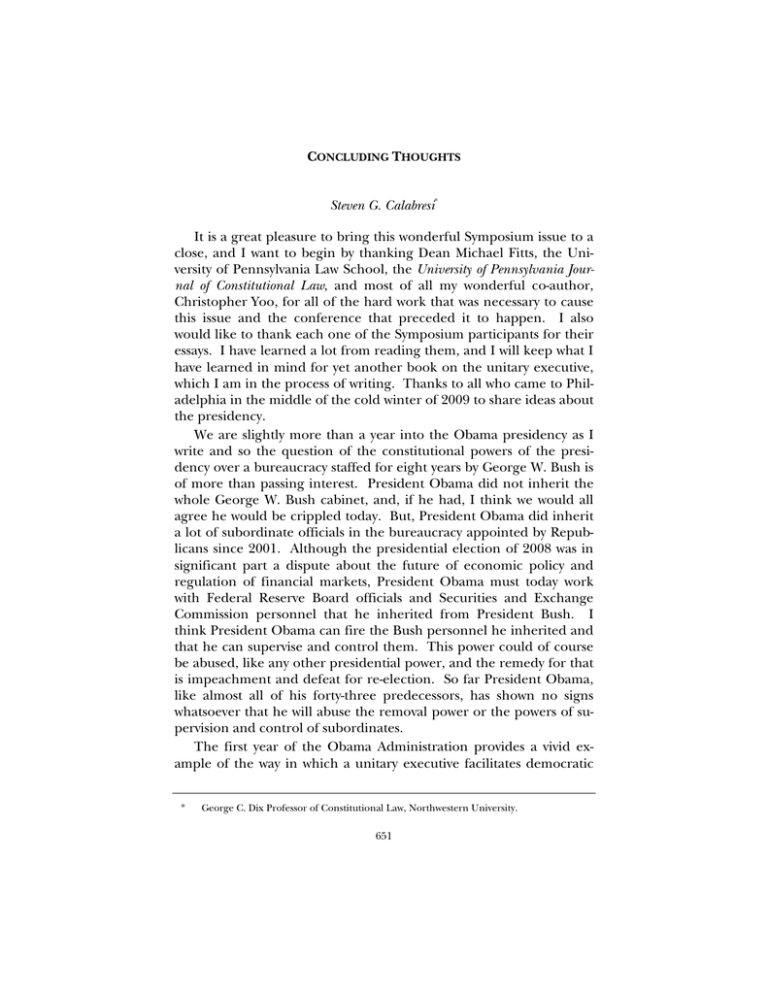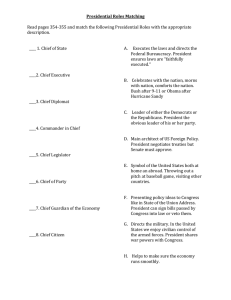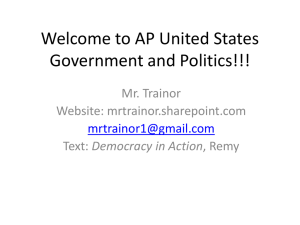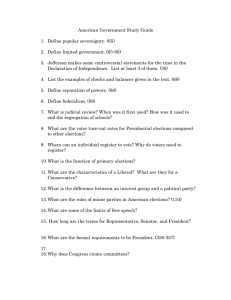Concluding Thoughts
advertisement

CONCLUDING THOUGHTS * Steven G. Calabresi It is a great pleasure to bring this wonderful Symposium issue to a close, and I want to begin by thanking Dean Michael Fitts, the University of Pennsylvania Law School, the University of Pennsylvania Journal of Constitutional Law, and most of all my wonderful co-author, Christopher Yoo, for all of the hard work that was necessary to cause this issue and the conference that preceded it to happen. I also would like to thank each one of the Symposium participants for their essays. I have learned a lot from reading them, and I will keep what I have learned in mind for yet another book on the unitary executive, which I am in the process of writing. Thanks to all who came to Philadelphia in the middle of the cold winter of 2009 to share ideas about the presidency. We are slightly more than a year into the Obama presidency as I write and so the question of the constitutional powers of the presidency over a bureaucracy staffed for eight years by George W. Bush is of more than passing interest. President Obama did not inherit the whole George W. Bush cabinet, and, if he had, I think we would all agree he would be crippled today. But, President Obama did inherit a lot of subordinate officials in the bureaucracy appointed by Republicans since 2001. Although the presidential election of 2008 was in significant part a dispute about the future of economic policy and regulation of financial markets, President Obama must today work with Federal Reserve Board officials and Securities and Exchange Commission personnel that he inherited from President Bush. I think President Obama can fire the Bush personnel he inherited and that he can supervise and control them. This power could of course be abused, like any other presidential power, and the remedy for that is impeachment and defeat for re-election. So far President Obama, like almost all of his forty-three predecessors, has shown no signs whatsoever that he will abuse the removal power or the powers of supervision and control of subordinates. The first year of the Obama Administration provides a vivid example of the way in which a unitary executive facilitates democratic * George C. Dix Professor of Constitutional Law, Northwestern University. 651 652 JOURNAL OF CONSTITUTIONAL LAW [Vol. 12:2 control over the bureaucracy. The problem of how democratically to control large bureaucracies is one of the most vexing problems faced by modern government. I think the unitary executive set up by our Constitution responds to that problem by allowing the voters to elect an administrator-in-chief every four years. In his magnificent paper for this conference, my former Administrative Law teacher Jerry Mashaw has pointed to other mechanisms of popular control of the bu1 reaucracy that have been available since the founding. He mentions mechanisms including: (1) congressional control; (2) direct citizen involvement and participation; (3) decentralized administration; and (4) control through the political parties. I want to mention several reasons why I think control of the bureaucracy through the President is on the whole better. First, the American people clearly believe today that the most important decision they get to make in this democracy is the selection 2 of the President of the United States. Americans mobilize for presidential elections in enormous numbers; the selection process plays out over an eighteen month period of time; and the candidates for the presidency and their policy views are subjected to microscopic investigation. News coverage of presidential elections is incredibly comprehensive and thorough. And, a whole lot more people vote in presidential elections than vote in mid-term or off year elections. Voter turnout in presidential years usually exceeds sixty percent while 3 in mid-term elections it falls below forty percent. Voters act as if presidential elections are really important, as was illustrated in the Obama-McCain election through which we just lived. Millions of Americans mobilized passionately in the presidential election of 2008, and they all had in common the belief that it really mattered whether Obama or McCain won. I think the theory of the unitary executive, a theory with a 220 year pedigree, offers a way of realizing the current belief of contemporary Americans that presidential elections are really important. The President has few enumerated powers in Article II, Section 2. There is the Commander-in-Chief power, the power to request opinions; the pardon power, and then two powers—the appointment power and the treaty power—which the President shares with the Se- 1 2 3 See Jerry L. Mashaw, Center and Periphery in Antebellum Federal Administration: The Multiple Faces of Popular Control, 12 U. PA. J. CONST. L. 331 (2010). See Steven G. Calabresi & James Lindgren, The President: Lightning Rod or King?, 115 YALE L. J. 2611, 2613 (2006). Id. at 2620. Feb. 2010] CONCLUDING THOUGHTS 4 653 nate. Article II, Section 3 imposes a series of duties on the President like the duties to give a State of the Union Address, to receive ambas5 sadors, and to take care that the laws be faithfully executed. It would be impossible for the President to fulfill those duties or for that matter his oath to preserve, protect, and defend the Constitution of the 6 7 United States unless the Vesting Clause of Article II gave him the executive power and made him, in effect, our Administrator-in-Chief. The American people today act as if the President has that power. Hundreds of thousands of people would not attend rallies over an eighteen month period of time to select a person who receives ambassadors and requests opinion from the heads of departments! The importance of the presidential election and of the President’s mandate from winning it is only augmented by the fact that other features of our Constitution act as a formidable check on the President. First, it is an iron law of politics that the party in power in the White House loses seats in Congress in mid-term elections. President Reagan lost control of the House of Representative in the 1982 mid-term elections, and President Clinton lost both Houses of Congress in 1994. Second, it is also noteworthy that thirty-nine of the fifty state governorships, including all the big and powerful ones, turn over either in the mid-term election or in an off year election. Only eleven governors races are held on the same day as the presidential election. The party out of power in the White House thus always picks up several governorships because it usually wins mid-term or off year elec8 tions. What this means is that the presidential election for which everyone mobilizes and thinks is determinative usually selects someone who becomes a lightning rod, resulting in the empowerment of the President’s opponents. In other words, win the presidency today, and in eight years, your party will have lost control of Congress and of a majority of the governorships, including all of the most powerful ones. This process is already well under way for President Obama and the Democrats as they were swept out of the governors’ offices in November 2009 in New Jersey and Virginia. Recognizing the President’s power to control and supervise the administration is a modest step toward rectifying the imbalance that exists between the popular perception of the President’s power and his actual constitutional 4 5 6 7 8 See U.S. CONST. art II, § 2. See id. art II, § 3. Id. art. II, § 1. Id. Calabresi & Lindgren, supra note 2, at 2616–17. 654 JOURNAL OF CONSTITUTIONAL LAW [Vol. 12:2 powers of office. I am no fan of lawmaking by presidential decree, executive order, regulation, or proclamation, as I will explain further below, but I do think that recognizing the President’s administratorin-chief status is both constitutionally valid and brings the actual powers of the presidency more nearly in line with public expectations. Second, a main democratic alternative to presidential control of the bureaucracy is congressional control. Representatives and Senators are elected so why not let them control the bureaucracy just as they are the ones in which the Constitution vests the lawmaking power? The problem with a congressional government of this kind is that 9 Congress controls the bureaucracy primarily through its committees. Membership on the committees is to some extent a function of self selection since new members express preferences as to what committees they want a seat on. Farm state senators thus select to be on the Agriculture committees, while the representatives of Wall Street opt for the Finance Committee. Once on a committee, individuals move up through the seniority system. Since re-election rates for members of Congress are comparable to those in the former Soviet Union, it is not impossible for a Senator to serve on an oversight committee for fifty years as Robert Byrd has done and as Ted Kennedy came close to doing. Committee governance of the bureaucracy is problematic because it is cheaper to capture a Congressman or a Senator than it is to capture the President. House and Senate elections are very inexpensive and are easily influenced, as compared to presidential elections. Moreover, the members of the committees already will have selected themselves with the interests of their district and states in mind. Altruism does not guide farm state members of Congress toward the Agriculture Committees. My colleague Jide Nzelibe has argued that the median member of Congress as a whole is closer to the mean of national public opin10 ion. But, even if that were true, it is not the median member of Congress as a whole that tries to supervise and control the bureauc- 9 10 See Steven G. Calabresi, Some Normative Arguments for the Unitary Executive, 48 ARK. L. REV. 23, 103 (1995) (arguing for “Washingtonian style executive governance over a system of law administration by the congressional committees or by the federal courts”); Steven G. Calabresi & Nicholas Terrell, The Fatally Flawed Theory of the Unbundled Executive, 93 MINN. L. REV. 1696, 1703–04 (2009) (asserting that congressional committees are easily captured and that is a bad thing). Jide Nzelibe, The Fable of the Nationalist President and the Parochial Congress, 53 UCLA L. REV. 1217, 1221 (2006). Feb. 2010] CONCLUDING THOUGHTS 655 racy. It is the committee chairs and their staffs that do that, and they are easily captured. Presidential control of the bureaucracy is essential to stop the captured congressional committees from steering national law execution in ways that benefit their districts and states. Imagine for a moment that you are a bureaucrat and you face conflicting commands from the President who is here and gone in eight years and a Senator who has already served for thirty years and is set to go twenty more? Who would you expect the bureaucracy to listen to? The doctrine of the unitary executive is vital if the President is to have even a fighting chance against committee control of the government. The congressional committees are the stunted growth of a parliamentary system of government, and the only reason they cannot take over the Cabinet Departments is because the Incompatibility Clause prevents 11 members of Congress from holding executive or judicial offices. If we take away presidential power to supervise and to control the bureaucracy, we will find the parochial congressional committees exercising that power instead. Is there a way to reform the congressional committees so they are not so dysfunctional? Yes. I do not favor term limits for Representatives or Senators any longer, but I do favor them for membership on 12 a congressional committee. That would bring opinion on the committees more nearly in line with the opinion of the median member of Congress. We also might consider requiring that all communications between congressional committee members and their staffs and the bureaucracy be public and on the record. We all were shocked to discover two years ago that two former members of the New Mexico delegation had privately lobbied the Bush Administration to hire a more partisan U.S. Attorney for New Mexico. Conversations between the congressional committees and the agencies for which they are responsible should be public and on the record. There was a lot of sometimes justified complaining about the Bush Administration’s excessive secrecy, but there is a secrecy problem with the committees and the bureaucracy as well. Jerry Mashaw talks about the importance of publicity as a means of providing popular control of the bureaucracy, and I agree with him wholeheartedly on that. Let’s shine a spotlight on conversations between the bureaucracy and the Hill. 11 12 Steven G. Calabresi & Joan L. Larsen, One Person, One Office: Separation of Powers or Separation of Personnel?, 79 CORNELL L. REV. 1045 (1994). See also Steven G. Calabresi & James Lindgren, Term Limits for the Supreme Court: Life Tenure Reconsidered, 29 HARV. J. L. & PUB. POL’Y 769 (2006) (favoring term limits for Supreme Court Justices). 656 JOURNAL OF CONSTITUTIONAL LAW [Vol. 12:2 Third, Jerry points out many mechanisms of popular control of the administration in the antebellum years. He is, of course, absolutely right about that, and I certainly do not think the unitary executive is the only vehicle for providing popular control of law administration. The widespread use of civil juries in the antebellum years and the absence until circa 1840 of official immunity doctrines shielding government officials from lawsuits and were major checks on ad13 ministrative power. John Quincy Adams’s report of Massachusetts opposition to Jefferson’s embargo as manifesting itself in a judge trying upward of forty cases and not getting a single conviction is strik14 ing. I am troubled for both policy and constitutional reasons by our unwillingness to make greater use of civil juries in administrative law 15 cases and by the unreasonably broad official immunity doctrines, made up by the federal courts out of whole cloth. I do not know what, if anything, should be done to make greater use of civil juries or to cut back on official immunity, but I am certainly open to considering such ideas. The fact that there were such mechanisms of popular control in the antebellum years and that those very mechanisms have lapsed in our era is, I think, a reason to be even more vigilant about maintaining the popular check that the unitary executive provides. A fourth popular check on the administration that I would favor is to rein in broad legislative delegations of power. Here I must respectfully disagree with Jerry Mashaw, who made the definitive best case in favor of broad delegation in one of the most famous adminis16 trative law articles of the last half century. I think Congress often 13 14 15 16 See, e.g., Little v. Barreme, 6 U.S. (2 Cranch) 170, 179 (1804) (holding that official “instructions cannot change the nature of the transaction, or legalize an act which without those instructions would have been a plain trespass”). See Mashaw, supra note 1. See, e.g., Atlas Roofing Co. v. OSHRC, 430 U.S. 442 (1977). On the fundamentality of the right to jury trial in civil cases, see Steven G. Calabresi & Sarah E. Agudo, Individual Rights Under State Constitutions When the Fourteenth Amendment Was Ratified in 1868: What Rights Are Deeply Rooted in American History and Tradition?, 87 TEX. L. REV. 7, 77 (2008). See Jerry L. Mashaw, Prodelegation: Why Administrators Should Make Political Decisions, 1 J.L. ECON. & ORG. 81 (1985). Mashaw provocatively ends this article with a sly favorable reference to Machiavelli and Hobbes who together make a good case for unbridled executive power. Id. at 99. But, Hobbes’s heroes must have been Louis XIV and Charles II, at whose courts he resided, and it is of course they who paid Hobbes his retainer. Louis XIV even paid a secret retainer to Charles II—a fact that would have horrified the English people had they known it. The verdict of history is that it is Louis XIV who, with his overcentralization and absolutism, set in motion the chain of events that led to the French Revolution while Charles II’s brother was overthrown a mere three years after his death. See generally MICHAEL BARONE, OUR FIRST REVOLUTION: THE REMARKABLE BRITISH UPHEAVAL THAT INSPIRED AMERICA’S FOUNDING FATHERS (2007). My vision of executive Feb. 2010] CONCLUDING THOUGHTS 657 aggrandizes power to itself when it delegates power because it often delegates the power to an executive entity that Congress’s own oversight committee can control. Where that happens, the Montesquiean separation of legislative and executive power is breached. The more independent the entity in question is made of the President, the more likely it will be that the congressional committees with control over the purse and ability to hold career ending hearings will acquire power and control. The best ways to rein in broad congressional delegations of power are, first, to make all such delegations sunset after a term of years and, second, to require that when Congress does delegate it does so to an entity that Congress knows is controlled by Congress’s institutional rival, the President. It is for this reason that Justice Rehnquist argued that the Su17 preme Court was wrong in INS v. Chadha to uphold the delegation in that case of the power to stay deportations along with the legislative veto, which the Supreme Court quite rightly found unconstitu18 tional. Rehnquist thought it was almost inconceivable that the Congress that passed the Act under review in Chadha, with so broad a delegation, would have done so if Congress had known that its legislative veto check on the power it was delegating would be held by the 19 courts to be unconstitutional. Rehnquist’s argument in Chadha was wrong because it allowed his guess as to congressional intent to trump the plain language of the sweeping severability clause that was at issue in the case. It may well be that the non-delegation doctrine is not judicially enforceable, but it would be nice if the federal courts could at least make Congress reconsider statute by statute whether it wants to delegate particular powers knowing that it cannot retain control through the legislative veto. Whether it can do that or not depends, however, on the language of the Severability Clause that is in question. I do not favor giving the President by statute a kind of plebiscitary lawmaking power, and I do think forcing Congress to police itself better on delegations would thus be a good idea. Knowing that all delegated power will be controlled by Congress’s institutional rival—the President—and not by the oversight committees would cause Congress to delegate with more restraint. A fifth and final popular check on administrative power comes from departmentalism itself—the idea that all three branches of the 17 18 19 power is a Lockean preference for something like the regime of William and Mary. They, of course, governed together with Parliament and under the law, unlike Louis XIV. 462 U.S. 919 (1983). Id. at 1013–16 (Rehnquist, J., dissenting). Id. 658 JOURNAL OF CONSTITUTIONAL LAW [Vol. 12:2 national government play a role in constitutional enforcement. Presidents do get some strange ideas about presidential power from time to time, and it is vital that Congress and the courts push back to the extent they can when that happens. Thanks fortunately to the twoterm limit there is a real constraint on how much damage a President can do. We ought not to favor judicial supremacy in constitutional interpretation any more than we favor presidential or congressional supremacy in constitutional interpretation. Our refuge lies as Madison said it would in The Federalist 51 in three-branch enforcement of 20 constitutional rights. A lot of attention has been paid to judicial and congressional views on the removal power issue. Chris Yoo and I hope we have redressed the balance a bit by looking at presidential views on the same subject. Thanks to all who have contributed to this issue for making this such a wonderful Symposium. 20 THE FEDERALIST NO. 51 (Madison).




